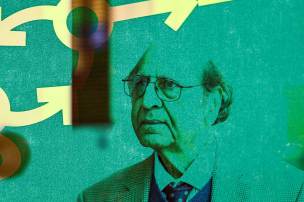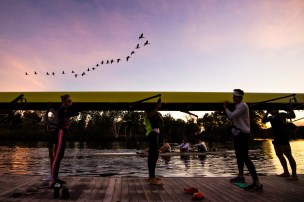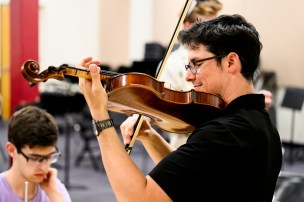Published on
A coach helped Ashley Phillips become a soccer All-American. Now she coaches Northeastern to become champions
Talent alone won’t fulfill the Huskies’ dream of a Colonial Athletic Association title, as Phillips knows from her own career as a star goalkeeper at Clemson a generation ago.
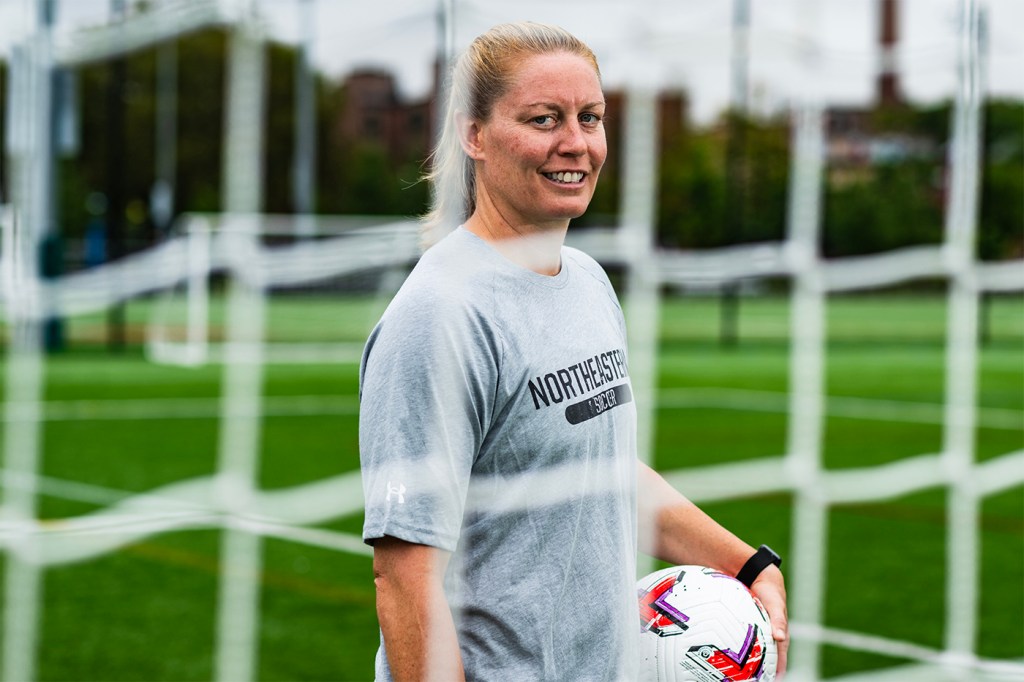
Northeastern’s last two seasons of women’s soccer have ended with heartbreaking losses in the conference championship game. The goal this season is to rise to that next step — and seize the NCAA tournament bid that comes with it. But talent alone won’t fulfill the Huskies’ dream, as coach Ashley Phillips knows from her own career as an All-American goalkeeper at Clemson a generation ago.
“I was fortunate that my college coach helped improve the outlook of my future,” says Phillips, who aims to do the same for the players she coaches today. “And trust me, it didn’t happen by always telling me I was awesome. He held me to standards and not without yelling — but I always knew he cared.”
So promising was Phillips’ talent that her coach at Clemson, Todd Bramble, still remembers receiving her commitment in 2004.
“When I got the phone call on the bus and I let our staff and team know about it, it was a big celebration, a big cheer went up,” says Bramble, who was in his third season at Clemson. “It all started with her. We put our team on her back.”
Bramble also recalls that Phillips wasn’t instantly ready for the responsibility. Lessons from her ultimately triumphant relationship with Bramble help inform Phillips’ management of the current Huskies, her most talented team in eight seasons at Northeastern.
“She’s definitely a tough coach,” Northeastern assistant captain Faith Rosenblatt, a senior defender, says of Phillips. “And I think you have to have a tough coach in our league. It’s the only way that you can really compete, and she’s given us so many opportunities to win the championship.
“After you’re done freaking out when she’s yelling at you, you have to know that she’s calling you up — she’s not calling you out. She has respect for you, she knows that you can handle it and she just knows there’s more in you that she wants to bring out.”
In these early days of their season the Huskies (4-2-3) are pursuing standards that aren’t easy to meet. Phillips’ experiences as a player have helped her to build a winning program with lasting impact.
The Huskies are built to win around striker Vivian Akyirem, midfielders Alexis Legowski and Jessie Hunt and goalkeeper Holland Stam — all award-winners last year.
“As a coach you’re going to see things in your student-athletes that they don’t even see in themselves, that they don’t even know they’re capable of doing,” Bramble says. “You’ve got to be able to push them and break through some mental barriers to bring out their full potential.
“But you have to do that from a place of love. You have to invest time and be intentional about building relationships — or else the message doesn’t come with much credibility.”
‘She’s a one-percenter’
Phillips has gone 69-52-12 while leading Northeastern to a half-dozen CAA semifinals and four conference title games, including a championship in her debut year. In those seven full seasons her players have earned 40 All-CAA awards. And yet Bramble could not have envisioned that his star goalkeeper would become a successful Division 1 head coach — at least not during her first two years at Clemson.
“But by her junior year — and certainly her senior year — I would have told you she’d make an awesome coach,” Bramble says. “Because I think she had a lot of things figured out by then.”
She was an explosive athlete with a fearless nature. That combination led to a variety of painful collisions that Phillips lives with to this day.
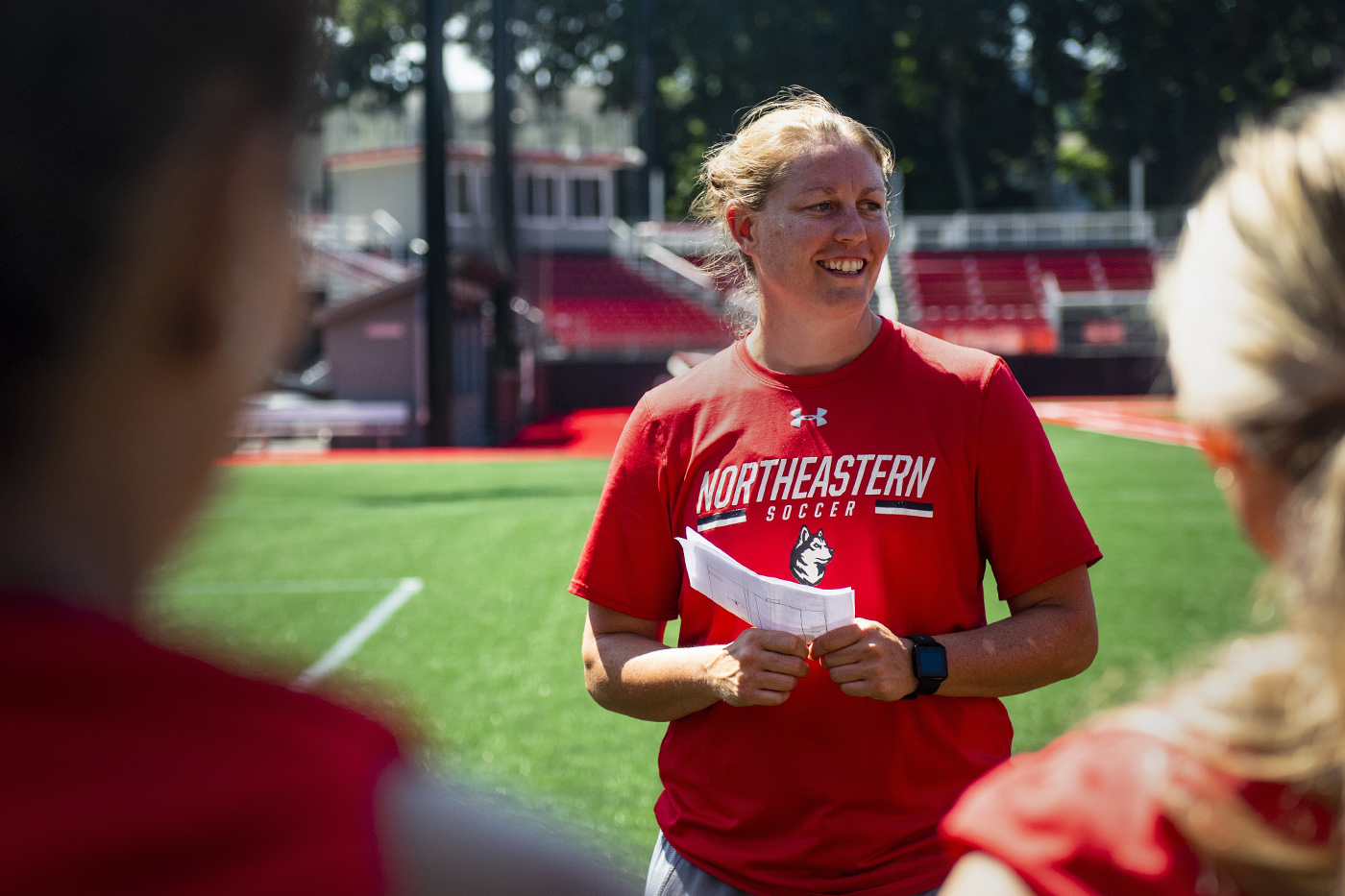
“I shattered my orbital bone, I tore my ACL, I had some other nice things: shoulder repairs, split both eyebrows, concussions — not a significant number but a couple here and there,” says Phillips, who anticipates undergoing knee and shoulder replacement surgery in the years ahead. “In goalkeeping you’re literally throwing yourself to the ground consistently and you’ve got to know you’re giving up a lot to stick with that position.”
The approach to player wellbeing has evolved since her playing days, Phillips notes.
“I’m definitely way more responsible” with issues of her players’ health than she was with her own, she acknowledges. But in her own case, Phillips adds, “I wouldn’t change any of it.”
As a young player in suburban Boston, Phillips would lose interest if the ball wasn’t in her zone.
“My mom used to make jokes,” Phillips says. “I’d be watching other games and she’s like, ‘You can’t do that.’”
Bramble describes her as a star who was learning the responsibilities of team leadership.
“She just had a lot of energy,” Bramble says. “And if she didn’t have something that she needed to be doing — like soccer practice or working out or doing a school project — she couldn’t just chill out with her friends. She was always looking for something to do. Sometimes that can be good. Sometimes that might not be good.”

By her junior season, Phillips’ grasp of the bigger picture helped her lead Clemson to the NCAA quarterfinals — the deepest run of Bramble’s soccer career as women’s head coach at Clemson, Alabama and George Mason.
“It could still be a record to this day: We won our first three games in the NCAA tournament without actually winning a game,” Bramble says. “We advanced on penalty kicks and our fifth shooter never even made an attempt in any of those shootouts because Ashley always made at least one save. I think everybody on our team and our staff would have no reservations in pointing to Ashley Phillips as the most valuable player who contributed the most to our success.”
Bramble calls Phillips the best goalkeeper of his 30-year coaching career. And yet it isn’t the victories that he remembers best.
“The thing I’m probably most proud of, having spent the quality time that I did with her in her developmental years, is the amount of personal growth and development that we witnessed in Ashley,” says Bramble, who stopped coaching in 2021 to become deputy athletic director at George Mason.
“To see her be able to work through that and manage that, and do the soul searching that she needed to do to find out the type of person that she really wanted to become — and the fact that she’s turned out to be an awesome leader of young women after a successful playing career. It speaks volumes to the type of person that she’s turned out to be.”
Bramble says her evolving maturity strengthened her charisma, drawing teammates around her — much as he imagines the players at Northeastern are drawn now to her as their coach.
“I fill out a lot of job references and always get a question of, ‘Would you put this person in the top 1%, 10%, 50% of all people you’ve worked with?” Bramble says. “She’s a top one-percenter for me.”
‘She wants to care’
Instead of glancing over at the adjacent fields, Phillips used her quiet time in goal to study and learn the sport.
“They always say goalkeepers make the best coaches because they are behind everything,” says Alan Goggs, an Englishman who serves as Phillips’ associate head coach. “You can imagine a goalkeeper is looking at the tactical play, how the players communicate, how they’re organized. She’s been able to carry that over into her coaching.”
Playing professionally with four teams, Phillips benefited from playing alongside an array of elite teammates that included U.S. national team star Kristine Lilly. The end of her playing career with the Boston Breakers overlapped with the start of her coaching career at Northeastern as she worked both jobs simultaneously. After six years as an assistant to Northeastern coach Tracey Leone, Phillips took over the program as interim head coach in 2016 — and immediately won the CAA title.
“That team, they would run through a brick wall for you,” Phillips says. “We were probably not the most talented team I’ve been a part of here. But the way they worked and competed, it was almost like you couldn’t tell them they weren’t going to be able to do it. They weren’t all best buds, but they all had one mission and they left everything else behind when they came out to the soccer field.”
She remembers the joy in their faces as they celebrated the championship.
“That was amazing,” Phillips says. “And we’ve been chasing it ever since.”
The conference title losses of the past two seasons have been suffered against Hofstra. When the Huskies went down 2-1 in double overtime on their home field, just 90 seconds before the penalty shootout, Phillips commiserated with her players.
“She was not disappointed at us but disappointed for us,” Rosenblatt says. “She felt bad for us. She was like, ‘I know you guys gave it your all.’ She was sharing in the pain. But I think it made her hungrier to get back and see what we can do next.”
Year by year Phillips has been growing the program around a mission that transcends the games they’re devoted to winning.
“I’ve never been on a team with this much depth,” Rosenblatt says. “It’s really cool that you can give it your all and know that the person coming on for you is going to be just as good — or even better because they have fresh legs. But I think it’s also why Ash has been pretty hard on us with her standards, because she knows that we have what it takes to get there and finally lift up that trophy.”
The title chase is driven by a holistic perspective. Rosenblatt notes that if players are having a tough day on the field, Phillips urges them to cheer and celebrate their teammates. It’s understood that learning to deal with the pressures of soccer is a life skill that will help the Huskies manage greater pressures in the real world long after they’ve moved on from Northeastern.
Goggs credits his boss with being available to support the players in all aspects of their lives. Rosenblatt is reminded of that every time she and her coach have conversations that delve into areas beyond soccer.
“It’s nice to never be nervous to ask a question,” says Rosenblatt, who as a sophomore transferred to Northeastern after her elder cousin, Hannah, had starred for the Huskies. “I never wonder, like, ‘What is she thinking of me?’ Whereas I’ve known of other teams where the players are scared of their coaches. And I really feel bad for them. Because I couldn’t imagine being scared to walk into Ash’s office and have a conversation.
“No matter your role on the field, Ash is open to having a relationship with you. So you could be playing 90 minutes a game, or you could be playing zero or 15; when it comes down to it, she wants to care.”
Ian Thomsen is a Northeastern Global News reporter. Email him at i.thomsen@northeastern.edu. Follow him on Twitter @IanatNU.


